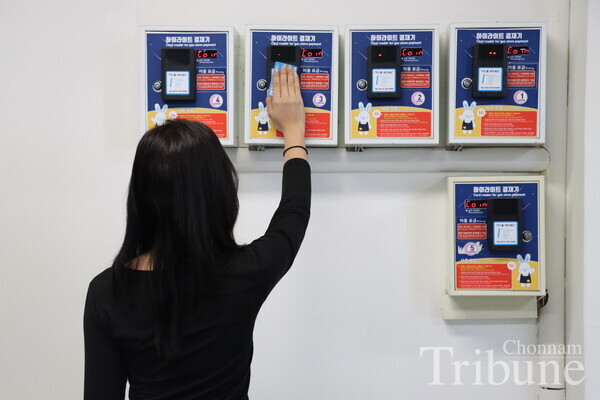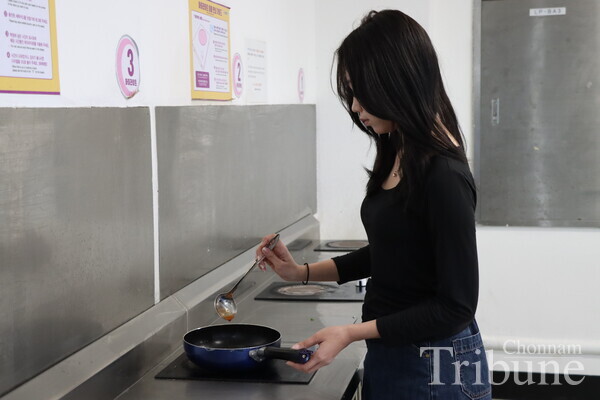
With Chonnam National University (CNU) welcoming a number of international students, ensuring adequate welfare support has become essential for fostering an inclusive environment. Despite the university’s efforts to support its international students, many still struggle with everyday challenges that affect their overall well-being and integration into their new environment. Recently, concerns have emerged regarding the lack of cafeterias in Residence Halls 7 and 8, as well as ongoing difficulties related to accessing health insurance. These problems not only impact students’ well-being but also raise questions about the inclusivity and effectiveness of the support systems available to the university’s international students. The Chonnam Tribune examines how these issues affect student life and what improvements could be made to improve their welfare.
Challenges in Preparing Daily Meals
Residence Halls 7 and 8 house a significant number of international students, and currently lack on-site cafeteria facilities. This situation resulted from operational changes over time. Residence Hall 7, which had offered meals through its own cafeteria from 2002 to 2008, was converted for faculty and staff use following the opening of the Residence Hall 9 in 2008—leading to the permanent closure of its cafeteria.
This absence has created a daily inconvenience for students, many of whom must either prepare their own meals or travel to nearby restaurants. Bengu Simal Comez (Sophomore, Dept. of Korean Language and Literature),said, “Since there is no cafeteria in Residence Hall 8, I end up eating out and ordering food all the time, which costs a lot of money.” Adding to the problem, cooking facilities in the dormitories come with limitations. Since there are only five stoves shared between both buildings A and B in Residence Hall 8, students must often wait a long time to use them. Than Than Htay (Master’s Student, Dept. of Applied Plant Science) explained, “As the dormitory system allows students to use the stoves at the rate of 100 won per 10 minutes, the prices can add up when cooking meat that takes longer.”

Current Medical Insurance System
International students have also experienced particular hardships when facing unexpected medical emergencies and health challenges. Several accidents and hospitalizations involving international students have been reported at CNU. One notable case occurred in July 2025, when an international student from the CNU Language Education Center (LEC) collapsed due to a cerebral hemorrhage and was immediately rushed to the hospital. While she survived, she was left in serious condition and faced severe financial difficulties. As a subscriber to the National Health Insurance System (NHIS), only part of her hospital expenses were covered. However, the remaining costs still imposed a heavy financial burden on her and her family.
This incident highlights the serious medical and financial challenges that international students may encounter during their stay at CNU. Since March 2021, all international students have been required to enroll in the NHIS. For D-2 visa holders (degree-seeking students in bachelor’s, master’s, or doctoral programs, as well as exchange students), enrollment is mandatory immediately upon arrival. In contrast, D-4 visa holders (students studying Korean at the LEC) are only eligible to join six months after entering Korea. During this six-month uninsured period, students are particularly vulnerable, as unexpected illnesses or accidents could result in overwhelming medical expenses.
CNU’s Response
In response to students’ complaints about the lack of on-site cafeteria and cooking facilities, the dormitory office said that it is planning to introduce new open lounges to provide a more convenient and comfortable dining environment for students, and emphasized that safety remains its top priority in managing shared facilities. “Because the communal kitchens are used by many students, creating a safe environment is essential,” dormitory officer Hwang Boyeon explained. “The stoves installed are prone to overheating, so the fee system ensures fire prevention by automatically cutting off power after a set period.”
Meanwhile, to address D-4 visa health concerns, CNU requires all international students at the LEC to be covered by private insurance during the non-NHIS period. After subscribing to NHIS, private insurance is optional but highly recommended. However, because it must be paid personally by students, it cannot be made compulsory for all international students. “Our office wants all international students to have private insurance. However, since it involves personal payment, we cannot force them—but we strongly recommend it,” said Kang Shin-hye, manager of the Office of International Affairs (OIA). The OIA is currently exploring ways to make it easier for international students to subscribe to private insurance.
Toward a More Inclusive Welfare System
Addressing challenges surrounding daily meals and health insurance is not merely a matter of convenience—it is essential for protecting students’ health, supporting their academic performance, and enhancing their overall well-being. Based on these concerns, several practical improvements should be considered. Establishing at least a small cafeteria or adding more stoves could help ease congestion in shared kitchens.
On the healthcare side, the OIA and LEC should strengthen informational outreach and more actively assist students in the process of private insurance enrollment. As CNU continues to build its global reputation, investing in such welfare measures would not only improve international students’ quality of life, but also foster a more inclusive, supportive, and globally A student prepares food on the stove in Residence Hall 8. minded campus community.
By Antiquando Daniela, Reporter
Zuly Moe, Reporter
